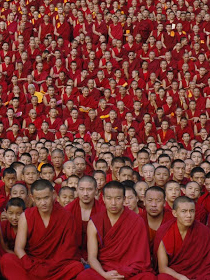- Home
- FPMT Homepage
Foundation for the Preservation of the Mahayana Tradition
The FPMT is an organization devoted to preserving and spreading Mahayana Buddhism worldwide by creating opportunities to listen, reflect, meditate, practice and actualize the unmistaken teachings of the Buddha and based on that experience spreading the Dharma to sentient beings. We provide integrated education through which people’s minds and hearts can be transformed into their highest potential for the benefit of others, inspired by an attitude of universal responsibility and service. We are committed to creating harmonious environments and helping all beings develop their full potential of infinite wisdom and compassion. Our organization is based on the Buddhist tradition of Lama Tsongkhapa of Tibet as taught to us by our founders Lama Thubten Yeshe and Lama Thubten Zopa Rinpoche.
- Willkommen
Die Stiftung zur Erhaltung der Mahayana Tradition (FPMT) ist eine Organisation, die sich weltweit für die Erhaltung und Verbreitung des Mahayana-Buddhismus einsetzt, indem sie Möglichkeiten schafft, den makellosen Lehren des Buddha zuzuhören, über sie zur reflektieren und zu meditieren und auf der Grundlage dieser Erfahrung das Dharma unter den Lebewesen zu verbreiten.
Wir bieten integrierte Schulungswege an, durch denen der Geist und das Herz der Menschen in ihr höchstes Potential verwandelt werden zum Wohl der anderen – inspiriert durch eine Haltung der universellen Verantwortung und dem Wunsch zu dienen. Wir haben uns verpflichtet, harmonische Umgebungen zu schaffen und allen Wesen zu helfen, ihr volles Potenzial unendlicher Weisheit und grenzenlosen Mitgefühls zu verwirklichen.
Unsere Organisation basiert auf der buddhistischen Tradition von Lama Tsongkhapa von Tibet, so wie sie uns von unseren Gründern Lama Thubten Yeshe und Lama Thubten Zopa Rinpoche gelehrt wird.
- Bienvenidos
La Fundación para la preservación de la tradición Mahayana (FPMT) es una organización que se dedica a preservar y difundir el budismo Mahayana en todo el mundo, creando oportunidades para escuchar, reflexionar, meditar, practicar y actualizar las enseñanzas inconfundibles de Buda y en base a esa experiencia difundir el Dharma a los seres.
Proporcionamos una educación integrada a través de la cual las mentes y los corazones de las personas se pueden transformar en su mayor potencial para el beneficio de los demás, inspirados por una actitud de responsabilidad y servicio universales. Estamos comprometidos a crear ambientes armoniosos y ayudar a todos los seres a desarrollar todo su potencial de infinita sabiduría y compasión.
Nuestra organización se basa en la tradición budista de Lama Tsongkhapa del Tíbet como nos lo enseñaron nuestros fundadores Lama Thubten Yeshe y Lama Zopa Rinpoche.
A continuación puede ver una lista de los centros y sus páginas web en su lengua preferida.
- Bienvenue
L’organisation de la FPMT a pour vocation la préservation et la diffusion du bouddhisme du mahayana dans le monde entier. Elle offre l’opportunité d’écouter, de réfléchir, de méditer, de pratiquer et de réaliser les enseignements excellents du Bouddha, pour ensuite transmettre le Dharma à tous les êtres. Nous proposons une formation intégrée grâce à laquelle le cœur et l’esprit de chacun peuvent accomplir leur potentiel le plus élevé pour le bien d’autrui, inspirés par le sens du service et une responsabilité universelle. Nous nous engageons à créer un environnement harmonieux et à aider tous les êtres à épanouir leur potentiel illimité de compassion et de sagesse. Notre organisation s’appuie sur la tradition guéloukpa de Lama Tsongkhapa du Tibet, telle qu’elle a été enseignée par nos fondateurs Lama Thoubtèn Yéshé et Lama Zopa Rinpoché.
Visitez le site de notre Editions Mahayana pour les traductions, conseils et nouvelles du Bureau international en français.
Voici une liste de centres et de leurs sites dans votre langue préférée
- Benvenuto
L’FPMT è un organizzazione il cui scopo è preservare e diffondere il Buddhismo Mahayana nel mondo, creando occasioni di ascolto, riflessione, meditazione e pratica dei perfetti insegnamenti del Buddha, al fine di attualizzare e diffondere il Dharma fra tutti gli esseri senzienti.
Offriamo un’educazione integrata, che può trasformare la mente e i cuori delle persone nel loro massimo potenziale, per il beneficio di tutti gli esseri, ispirati da un’attitudine di responsabilità universale e di servizio.
Il nostro obiettivo è quello di creare contesti armoniosi e aiutare tutti gli esseri a sviluppare in modo completo le proprie potenzialità di infinita saggezza e compassione.
La nostra organizzazione si basa sulla tradizione buddhista di Lama Tsongkhapa del Tibet, così come ci è stata insegnata dai nostri fondatori Lama Thubten Yeshe e Lama Zopa Rinpoche.
Di seguito potete trovare un elenco dei centri e dei loro siti nella lingua da voi prescelta.
- 欢迎 / 歡迎
简体中文
“护持大乘法脉基金会”( 英文简称:FPMT。全名:Foundation for the Preservation of the Mahayana Tradition) 是一个致力于护持和弘扬大乘佛法的国际佛教组织。我们提供听闻,思维,禅修,修行和实证佛陀无误教法的机会,以便让一切众生都能够享受佛法的指引和滋润。
我们全力创造和谐融洽的环境, 为人们提供解行并重的完整佛法教育,以便启发内在的环宇悲心及责任心,并开发内心所蕴藏的巨大潜能 — 无限的智慧与悲心 — 以便利益和服务一切有情。
FPMT的创办人是图腾耶喜喇嘛和喇嘛梭巴仁波切。我们所修习的是由两位上师所教导的,西藏喀巴大师的佛法传承。
繁體中文
護持大乘法脈基金會”( 英文簡稱:FPMT。全名:Found
ation for the Preservation of the Mahayana Tradition ) 是一個致力於護持和弘揚大乘佛法的國際佛教組織。我們提供聽聞, 思維,禪修,修行和實證佛陀無誤教法的機會,以便讓一切眾生都能 夠享受佛法的指引和滋潤。 我們全力創造和諧融洽的環境,
為人們提供解行並重的完整佛法教育,以便啟發內在的環宇悲心及責 任心,並開發內心所蘊藏的巨大潛能 — 無限的智慧與悲心 – – 以便利益和服務一切有情。 FPMT的創辦人是圖騰耶喜喇嘛和喇嘛梭巴仁波切。
我們所修習的是由兩位上師所教導的,西藏喀巴大師的佛法傳承。 察看道场信息:
- FPMT Homepage
- News/Media
-
- Study & Practice
-
-
- About FPMT Education Services
- Latest News
- Programs
- New to Buddhism?
- Buddhist Mind Science: Activating Your Potential
- Heart Advice for Death and Dying
- Discovering Buddhism
- Living in the Path
- Exploring Buddhism
- FPMT Basic Program
- FPMT Masters Program
- FPMT In-Depth Meditation Training
- Maitripa College
- Lotsawa Rinchen Zangpo Translator Program
- Universal Education for Compassion & Wisdom
- Online Learning Center
-
- Prayers & Practice Materials
- Overview of Prayers & Practices
- Full Catalogue of Prayers & Practice Materials
- Explore Popular Topics
- Benefiting Animals
- Chenrezig Resources
- Death & Dying Resources
- Lama Chopa (Guru Puja)
- Lama Zopa Rinpoche: Compendium of Precious Instructions
- Lama Zopa Rinpoche: Life Practice Advice
- Lama Zopa Rinpoche Practice Series
- Lamrim Resources
- Mantras
- Prayer Book Updates
- Purification Practices
- Sutras
- Thought Transformation (Lojong)
- Audio Materials
- Dharma Dates - Tibetan Calendar
- Translation Services
- Publishing Services
- Ways to Offer Support
- Prayers & Practice Materials
-
- Teachings and Advice
- Find Teachings and Advice
- Lama Zopa Rinpoche Advice Page
- Lama Zopa Rinpoche: Compendium of Precious Instructions
- Lama Zopa Rinpoche Video Teachings
- ༧སྐྱབས་རྗེ་བཟོད་པ་རིན་པོ་ཆེ་མཆོག་ནས་སྩལ་བའི་བཀའ་སློབ་བརྙན་འཕྲིན།
- Podcasts
- Lama Yeshe Wisdom Archive
- Buddhism FAQ
- Dharma for Young People
- Resources on Holy Objects
- Teachings and Advice
-
-
*If a menu item has a submenu clicking once will expand the menu clicking twice will open the page.
-
-
- Centers
-
- Teachers
-
- Projects
-
-
-
-
*If a menu item has a submenu clicking once will expand the menu clicking twice will open the page.
-
-
- FPMT
-
-
-
-
-
However the very bottom line is to do all ones actions with bodhichitta. That is the best, the most meaningful way to think during your break time. This makes your life most beneficial. As much as possible with awareness keep ones attitude and thoughts in bodhichitta, the thought of benefiting others, try to do all the activities with that mind, including doing your job and throughout the day. This way even in your break time whatever you do becomes the cause of happiness.
Share
Lama Zopa Rinpoche
-
-
-
- Shop
-
-
-
The Foundation Store is FPMT’s online shop and features a vast selection of Buddhist study and practice materials written or recommended by our lineage gurus. These items include homestudy programs, prayers and practices in PDF or eBook format, materials for children, and other resources to support practitioners.
Items displayed in the shop are made available for Dharma practice and educational purposes, and never for the purpose of profiting from their sale. Please read FPMT Foundation Store Policy Regarding Dharma Items for more information.
-
-
11
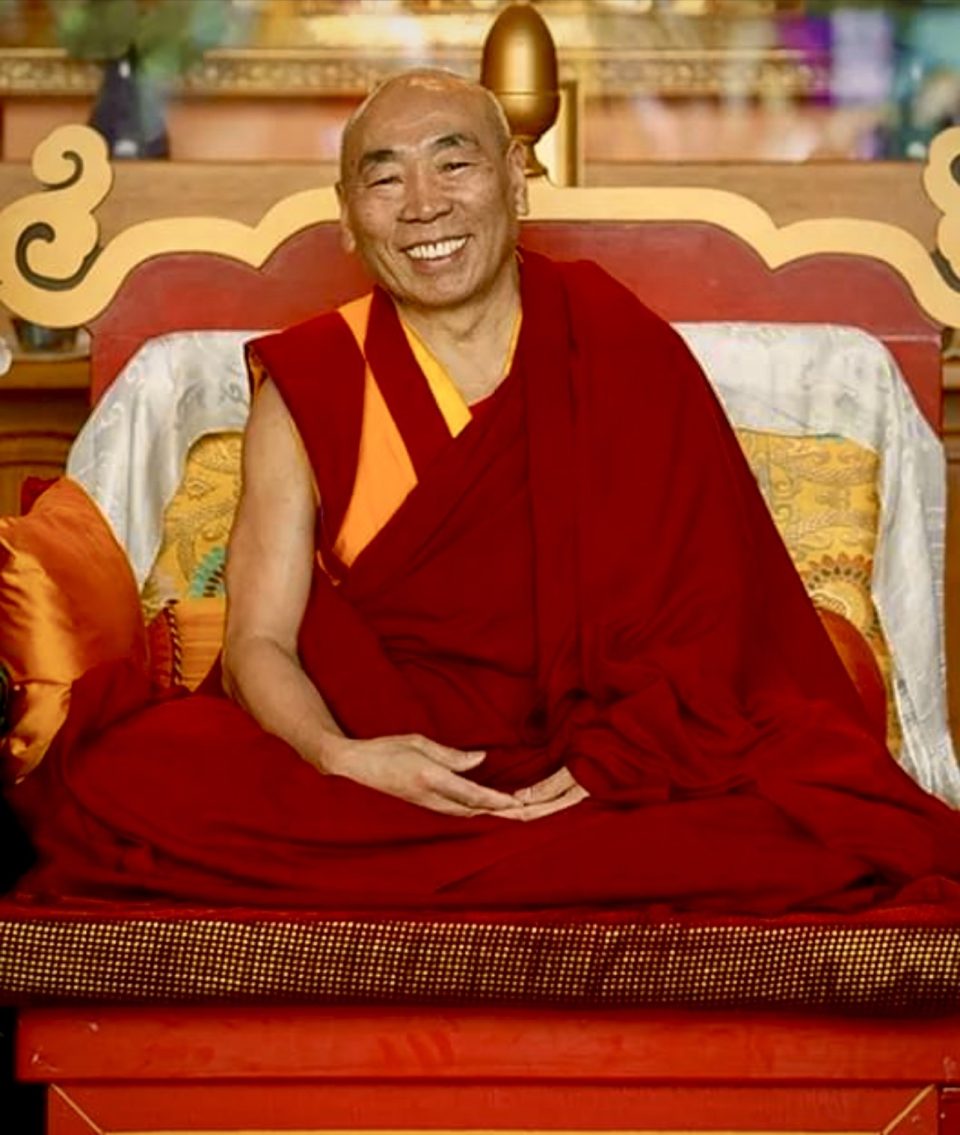
Geshe Doga portrait. Photo courtesy of Tara Institute.
Tara Institute, Melbourne, Australia, is extremely honored that Venerable Geshe Doga has been serving as their resident teacher for forty years. Please read their recent report about his kindness, guidance and invaluable teachings spanning four decades:
Staying an astonishing forty years at one FPMT center is an extraordinary accomplishment for any geshe. We at Tara Institute are so grateful to Geshe Doga for his priceless teachings, constant kindness, encouragement, guidance, holding us in his mandala, and putting up with our delusions and petty squabbles for four decades!
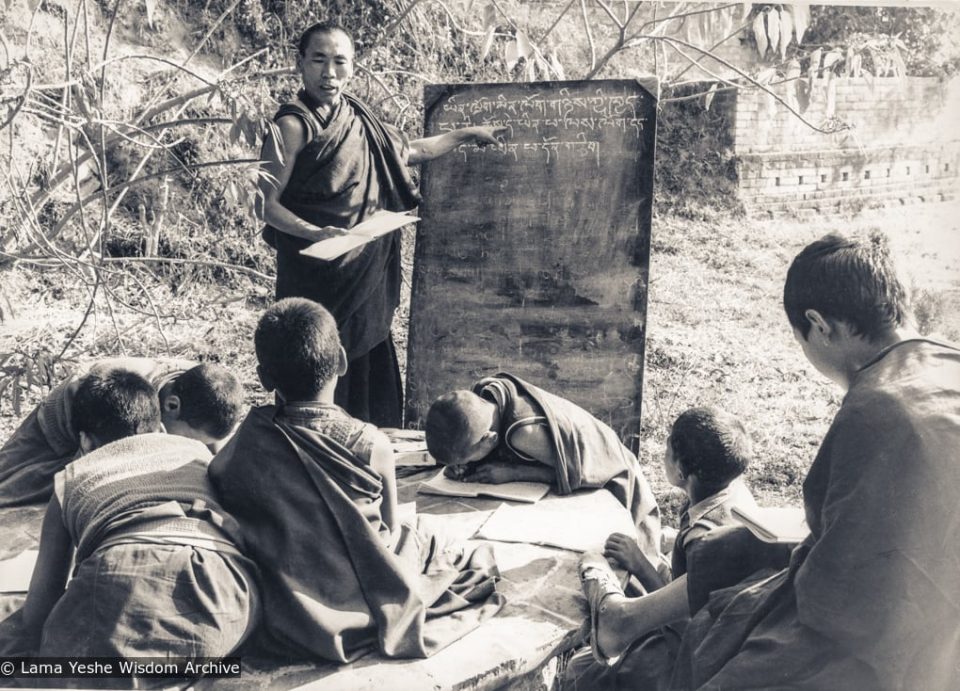
Geshe Doga teaching at Kopan Monastery, 1980. Photo courtesy of the Lama Yeshe Wisdom Archive.
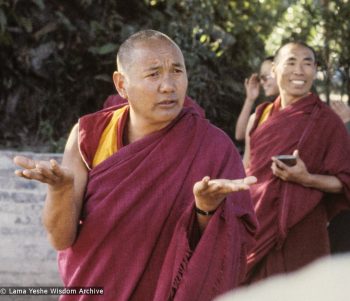
Lama Yeshe and Geshe Doga at Kopan Monastery, 1979. Photo by Jeff Nye, courtesy of the Lama Yeshe Wisdom Archive.
It all began in 1980 when Lama Yeshe “poached” Geshe Doga from Sera Je monastery in South India, in order for Geshe Doga to teach young monks in Kopan. Geshe Doga first met Lama Yeshe under the harsh conditions of the Buxa Duar Tibetan refugee camp in India, after escaping Chinese occupied Tibet in 1959.
After a couple of years at Kopan, Lama Yeshe asked Geshe Doga to teach in the West. He kept refusing Lama’s requests because he was happy at Kopan and had no interest in moving to the West. Finally relenting, Geshe Doga came out to Australia on January 1, 1983 to teach in the heat at Atisha Centre in Bendigo (way before the Great Stupa was built).
In late 1983, Geshe-la became the resident teacher of Tara Institute. Uprooted from his culture a second time (first when he escaped Tibet), away from his friends and his monastic traditions—he has steadfastly remained at Tara Institute all these years.
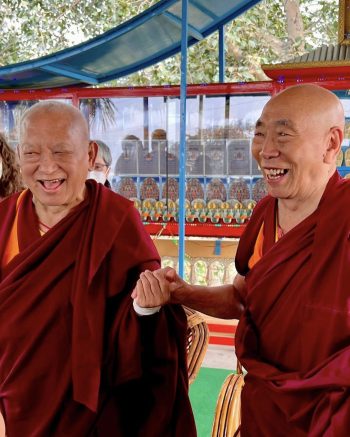
Lama Zopa and Geshe Doga, Bodhgaya, India, 2022. Photo by Cynthia Karena.
From Geshe Doga’s rural beginnings in 1935 in Khanze, a small village in the remote Kham region of northeast Tibet; to dangerous adventures on horseback at 16 years old riding to Lhasa to further his monastic studies; to living in basic conditions in the early days at Sera Je and Kopan monasteries (although far better than Buxa!)—Geshe Doga suddenly found himself living in Australia with all its material wealth and comforts, but also with plenty of untamed minds to work with.
Every time Lama Zopa Rinpoche visited Tara Institute, he asked us to treasure Geshe Doga and to heed his advice. Over the decades, TI has grown enormously, thanks to Geshe-la’s teachings, kindness and patient guidance.
Geshe Doga’s first, and again current, translator at Tara Institute, Sandup Tsering, says Geshe Doga’s friendship with both the late lamas—Lama Yeshe and Lama Zopa Rinpoche—is “very deep, personal and goes a long way. Both the lamas had shown special affection for Geshe-la, and wanted and trusted Geshe-la in their work for flourishing Dharma and benefiting migrating beings through FPMT. Geshe-la has never made any fuss, demands or complaints about his personal needs but wholeheartedly dedicated himself towards the success of the center and FPMT. Geshe Doga was well known in the monasteries in his time as a great debater and a scholar.”
When Geshe Doga first arrived at Tara Institute, we offered long-life pujas for his long and healthy life. Then Lama Zopa specifically instructed us to do five long life pujas for Geshe Doga, and we’ve just kept going, doing them each year for the past twenty-five years, increasing the number of flower garlands and tables with offerings—at least 500 offering bowls resplendent with saffron water, incense, flowers, candles, etc. The community comes together, both as volunteers and attendees, to thank our kind and venerable teacher Geshe Doga for his unwavering commitment and kindness to the students and friends of Tara Institute.
We are also currently fulfilling Lama Zopa’s advice to recite the Sutra of Golden Light 3,000 times for Geshe Doga’s long life. We have had numerous large group recitations at Tara institute and continue to do so, and students continue to recite the sutra at home. The tally at the time of writing is 2,342.
“Geshe Doga is much loved and much admired. There is a genuine equanimity in Geshe-la’s behavior toward others,” says Damien Busby, Monday night teacher and former director, who has been one of the people driving Geshe-la to the various teaching venues around Victoria for many years.
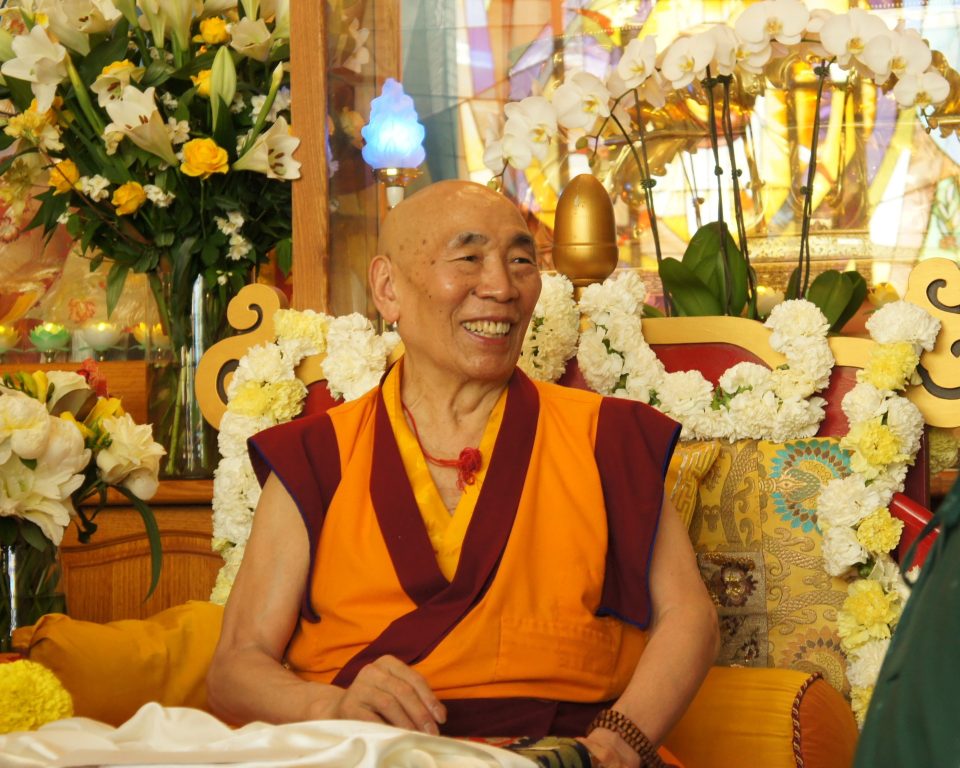
Geshe Doga during a long life puja, 2017. Photo by Damien Busby.
“My own interactions with Geshe Doga feel very precious and valuable over the last forty years. This same care and concern has been extended to hundreds, if not thousands, of others. These interactions are all unique and individual and suited to the needs and personality of the person. This is a remarkable skill and devotion to the welfare of others. Geshe Doga’s devotion to teaching is another extraordinary aspect. Teaching so consistently for over forty years and going wherever he was asked to teach, without question, has seen Geshela teach at more than twenty different locations in Victoria, Tasmania, and New South Wales.”
Student Katrina Moxey says, “His love for teaching Dharma and his unbiased love and compassion for all beings are palpable to anyone who has the fortune to be in his presence. It is no exaggeration to say he has changed my life. Every happiness I experience is directly related to Geshe Doga’s compassionate heart teachings.”
Another former director and long time student, Ross Moore remembers visiting Geshe Doga’s teacher Geshe Ngawang Dhargyey in Sydney in 1985. After asking Ross who his teacher is, Geshe Dhargyey whispered words Ross has never forgotten: “the kindest teacher of all is the one who lives amongst you.”
“This was clearly a reference to Geshe Doga,” Ross explains, “whom I had first met during Kyabje Zopa Rinpoche’s visit to Atisha Centre in 1983, and who was Geshe Ngawang Dhargyey’s own close student.”
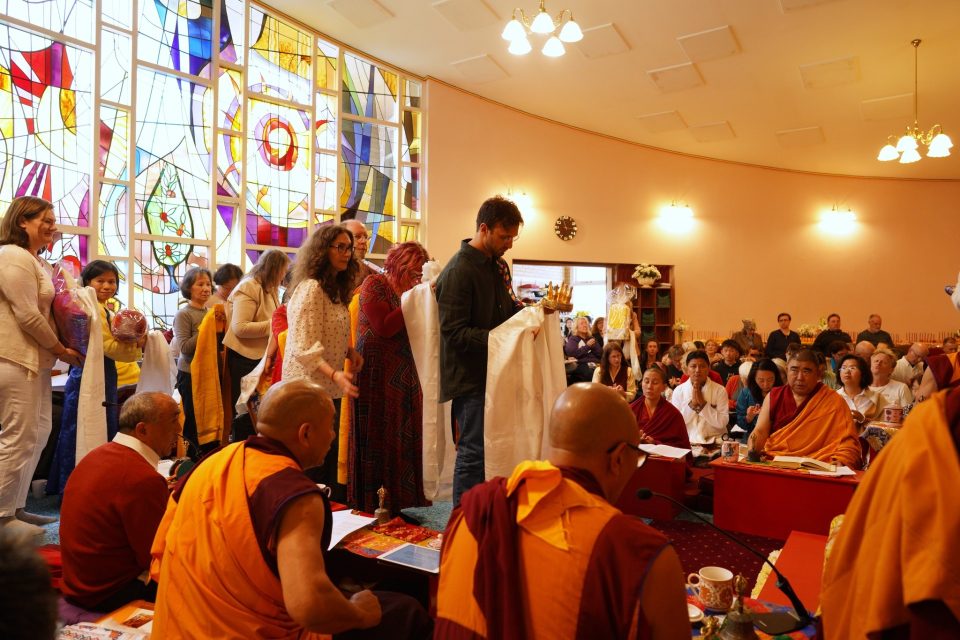
Students in procession during a long life puja for Geshe Doga, 2023. Photo courtesy of Tara Institute.
Over many years, Geshe Doga worked with Lama Zopa Rinpoche to guide Tara Institute, and as Ross says, “all the while quietly and patiently giving teachings of great profundity but also of immense practicality because, without a doubt, Geshe Doga is a real Kadampa master. Of that I have no doubt. It’s extraordinary that Geshe Doga deliberately and skillfully manifests as ordinary so that we can approach him. And he can reach us.”
When visiting Sera Je with Geshe Doga, the great respect for him was evident, says Ross. “But when invited to have his name included in a list of potential Abbots to be presented to His Holiness the Dalai Lama for divination and selection, Geshe Doga repeatedly said no. He would then calmly return to Australia and Tara Institute and continue his teachings from the exact point from where he had left off. It is a truly remarkable fact that Geshe Doga is not only the longest serving geshe in the FPMT organization but has stayed with us.”
Geshe Doga deliberately avoids any perception that he is extraordinary, says Ross. “He is perhaps mistaken by some as being – well – actually ordinary! Such a woeful misreading is a sign that in our own greedy quest for the extraordinary … we gloss over the most remarkable Guru of all – the one manifesting gently and unassumingly dwelling amongst us. A miraculous flower blooming unheralded in the public garden. This miscalculation on our part is surely the height of samsaric folly.”
Although Geshe Doga attended Allys and Dave Andrews’ wedding at Kopan Monastery in 1979, they met Geshe Doga in 1984 when he came to TI. “When family problems arose, his advice would solve them,” remembers Allys. “In times of deep sorrow and great joy, Geshe-la has been there as a guide. One of the greatest gifts he has given me is to have found courage. Quite early on Geshe-la advised me to lead Monday night meditation classes. I was completely terrified for years. Gradually the fear lessened. He is a most precious friend. I have no doubt that Geshe-la is clairvoyant. His view is vast, his advice, whilst sometimes seeming counterintuitive, has solved the most difficult of problems. He has inspired many, many people; at the center, the beach, the swimming pool, in shopping centers. He is amazing. Everything good in my life is a result of following his suggestions.”
We at Tara Institute remain devoted and forever grateful to Geshe Doga. We all resonate with the words Allys shared: “I pray that I will never be separated from him in this and all future lives until enlightenment. Geshe Doga makes awakening seem possible.”
We thank Tara Institute for this moving account of Geshe Doga’s qualities and service, with special thanks to Cynthia Karena, Ross Moore, Damien Busby, Allys Andrews, Sandup Tsering, and Katrina Moxey.
Foundation for the Preservation of Mahayana Tradition (FPMT), is a Tibetan Buddhist organization dedicated to the transmission of the Mahayana Buddhist tradition and values worldwide through teaching, meditation and community service.
- Tagged: geshe doga, tara institute
- Home
- News/Media
- Study & Practice
- About FPMT Education Services
- Latest News
- Programs
- New to Buddhism?
- Buddhist Mind Science: Activating Your Potential
- Heart Advice for Death and Dying
- Discovering Buddhism
- Living in the Path
- Exploring Buddhism
- FPMT Basic Program
- FPMT Masters Program
- FPMT In-Depth Meditation Training
- Maitripa College
- Lotsawa Rinchen Zangpo Translator Program
- Universal Education for Compassion & Wisdom
- Online Learning Center
- Prayers & Practice Materials
- Overview of Prayers & Practices
- Full Catalogue of Prayers & Practice Materials
- Explore Popular Topics
- Benefiting Animals
- Chenrezig Resources
- Death & Dying Resources
- Lama Chopa (Guru Puja)
- Lama Zopa Rinpoche: Compendium of Precious Instructions
- Lama Zopa Rinpoche: Life Practice Advice
- Lama Zopa Rinpoche Practice Series
- Lamrim Resources
- Mantras
- Prayer Book Updates
- Purification Practices
- Sutras
- Thought Transformation (Lojong)
- Audio Materials
- Dharma Dates – Tibetan Calendar
- Translation Services
- Publishing Services
- Teachings and Advice
- Find Teachings and Advice
- Lama Zopa Rinpoche Advice Page
- Lama Zopa Rinpoche: Compendium of Precious Instructions
- Lama Zopa Rinpoche Video Teachings
- ༧སྐྱབས་རྗེ་བཟོད་པ་རིན་པོ་ཆེ་མཆོག་ནས་སྩལ་བའི་བཀའ་སློབ་བརྙན་འཕྲིན།
- Podcasts
- Lama Yeshe Wisdom Archive
- Buddhism FAQ
- Dharma for Young People
- Resources on Holy Objects
- Ways to Offer Support
- Centers
- Affiliates Area
- Teachers
- Projects
- Charitable Projects
- Make a Donation
- Applying for Grants
- News about Projects
- Other Projects within FPMT
- Support International Office
- Projects Photo Galleries
- Give Where Most Needed
- FPMT
- Shop
Translate*
*powered by Google TranslateTranslation of pages on fpmt.org is performed by Google Translate, a third party service which FPMT has no control over. The service provides automated computer translations that are only an approximation of the websites' original content. The translations should not be considered exact and only used as a rough guide.Right understanding is the only solution to both physical and mental problems. You should always check very carefully how you’re expending your energy: will it make you happy or not? That’s a big responsibility, don’t you think? It’s your choice: the path of wisdom or the path of ignorance.







